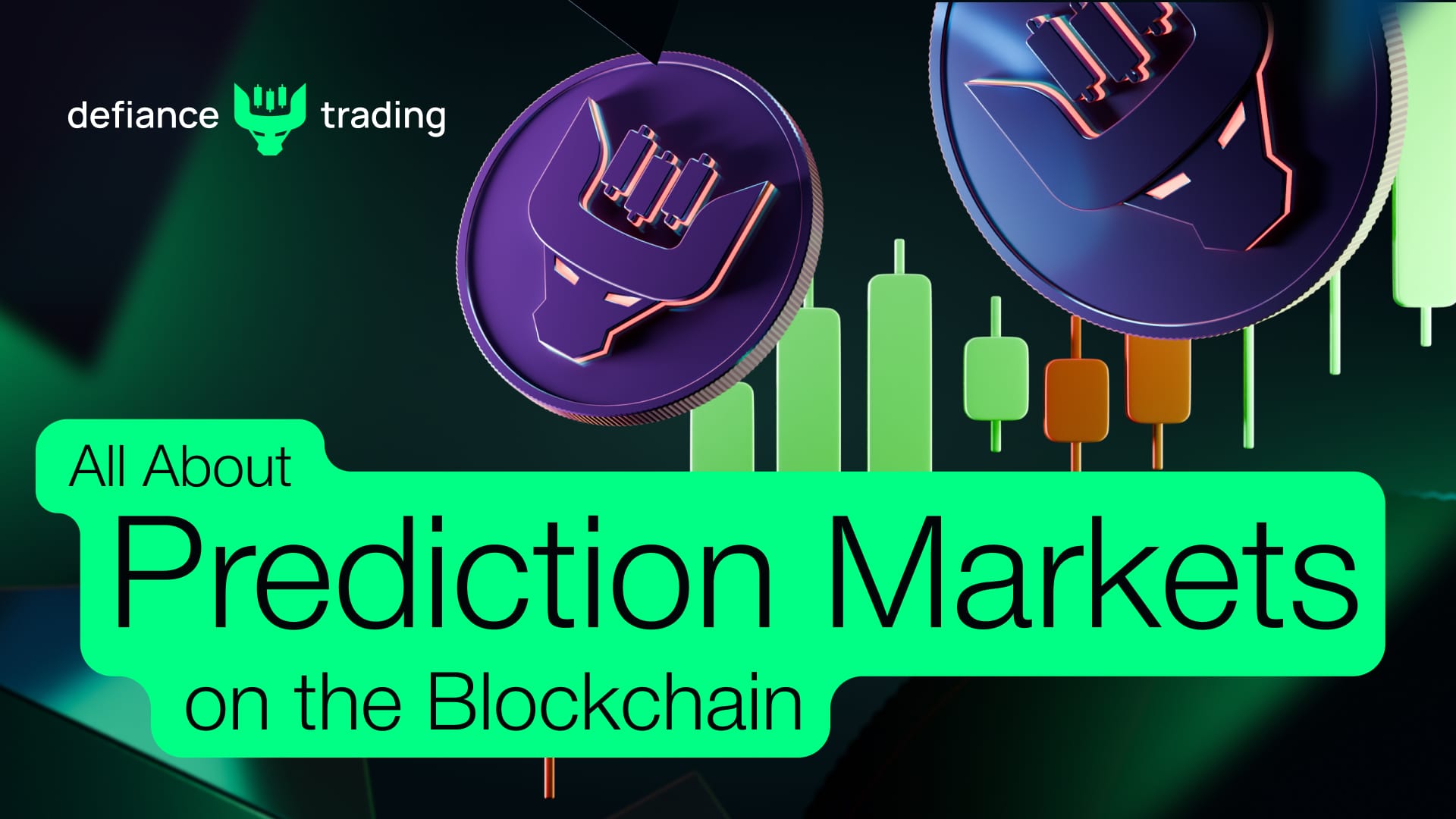All About Prediction Markets on the Blockchain

Prediction markets work on a simple principle: put your money where your mouth is. Make your best guesses and stand a chance to win some money. However, the market is mostly run by profit-hungry companies. Traditional prediction markets depend on a few experts and institutions to set odds. Also, big players distort predictions and cause low liquidity to trickle down, making earnings for small players almost nothing. Markets don’t exist for some niches leading to poor price discovery.
These issues bring us to today’s solution: prediction markets on the blockchain. No single entity or group of entities holds sway over outcomes and winnings. Prediction markets transform into an industry ruled by the players. With decentralization, one player can create a prediction and create a room for interested participants. Will Trump win a second attempt for the Presidency? What about Qatar’s bid to host the World Cup again? Will they succeed in convincing FIFA to shift an age-old summer affair to winter? Now, these predictions are ultra specific, and the winnings are proportional to inflows.
In this article, we will explore the evolution of prediction markets, how they operate on the blockchain, challenges so far, and current use cases.
Let’s dive in!
Understanding prediction markets
A market is where people exchange goods and services. This definition implies transactions involving tangible and intangible objects. Prediction markets operate within similar confines but under different circumstances. Participants risk their funds on commodities, speculating on the outcome of future events.
Prediction markets date back to bets on the papal successor in the 16th century. By 1884, there were records of predictions made on Wall Street over who’d be the next US president. Fast forward to 1988, the first electronic prediction market emerged as Iowa Electric Markets, run by the University of Iowa. This initiative is a non-profit setup, used mainly for research and educational purposes.
Until recently, centralized institutions have dominated the prediction markets. And they rake in huge yearly revenues, sign A list celebrities as ambassadors, and sponsor sporting arenas. The centralized entities, known as the house, set rules guiding participation to keep operations in their favor no matter the outcomes.
The aim is to attract people with the allure of getting rich overnight. While some providers have set low entry barriers, they crank up withdrawal limits to significant amounts. Some don’t even pay out winnings to customers. Prediction markets can get messy.
The solution: Prediction markets on the blockchain
The answer to the existential woes of prediction markets to date? Decentralization. When people can contribute insights and work with a bias-free system, everybody stands a chance to win. The market structure is dependent on wider public opinion to form a stronger standpoint.
Advantages of prediction markets on the blockchain
Cost friendly
Participants can enter with smaller amounts and withdraw the same without costly transactions. They can use P2P options to keep liquidity flow and cut out third parties. Transactions can cost as low as 1% of winnings, and this percentage returns to the community. Nobody can hold up money and refuse to pay. The smart contract fulfills itself and pays out accordingly, depending on a consensus outcome.
It is decentralized
Another upside to the blockchain approach is putting power in the hands of the people. This condition removes barriers to what market participants can place bets on. Anyone can create a unique prediction, and it doesn’t have to border on politics, sports, or stock prices. User creation modifies prediction into a more fun activity to engage friends and community.
Security
Security is another win. This feature preserves value and secures transactions. Most blockchain based prediction platforms use stablecoins as currency. This transaction medium allows payment transparency, so winners get settled quickly.
Transparency
Decentralization in prediction markets ensures transparency and trust among participants. The blockchain records smart contract code, liquidity flow, participant count, and reward distribution for everyone to see. Knowing there’s no foul play involved, more people desire to join and test their prediction mettle.
These qualities are rare finds in centralized systems. Bring whatever interests you have to the blockchain and create a pool for other enthusiasts. You set the rules!
How do prediction markets on the blockchain operate?
At the core of prediction markets on the blockchain are smart contracts. These self fulfilling codes reach completion when predetermined conditions are met. But one question comes to mind; how can the smart contract receive accurate information to distribute winnings correctly? How will it settle a bet on who will win the 2026 World cup?
Blockchain oracle
The common information source is a blockchain oracle. The oracle creates a verifiable web, reaching outside an otherwise isolated blockchain to offline data and feeds. A synergy between web3 and web2 makes decentralized applications more credible, as they can afford to react to real-time world happenings and permit integration with off chain systems.
Various kinds of oracles exist but the common type used for prediction markets is pull-based oracle. In three steps: data retrieval, verification and delivery, an oracle enables a smart contract to do its job.
Other protocols
Some other protocols depend on a decentralized network of validators to replace an oracle. They fetch market results and define outcomes. This group verifies the accuracy of a given outcome to ensure appropriate payouts. To prevent malicious actors from ruining the industry, the platform has a native token that validators must hold. The goal is to create a system, similar to staking, where validators stand to lose something if they provide false information. Now, everyone strives to be on their best behavior.
Reward system
Through any of these mechanisms, prediction platforms achieve outcome validation. The smart contract proceeds to distribute rewards to those with accurate predictions, according to locked liquidity and how many winners emerge.
What are the challenges with prediction markets on the blockchain?
Despite the new face it gives prediction markets, the blockchain remains susceptible to failure in these areas:
- Regulation
Regulation guiding blockchain prediction markets is a work in progress. This infancy in legal structures can cast doubts on safety for potential users. - Liquidity issues
However you look at it, the prediction market is a numbers game. It needs many users to pool sufficient liquidity. Low liquidity translates to poor trading experience. - False information
Some prediction markets depend on oracles to validate outcomes. If an oracle is compromised, the hacker can use it to feed multiple smart contracts with wrong data and deceive them to pay undeserving participants. - Base code flaws
A prediction market is only as good as its smart contract. Mistakes in the code create loopholes and cause colossal losses for the platform and their users.
What are the use cases of prediction markets on the blockchain?
Today, blockchain prediction markets serve the following sectors:
Elections
Last year’s general election strengthened the case for prediction markets. While various pollsters had no favorites for the Pentagon seat, Polymarket showed an early leader. President Donald Trump led the predictions with 58%, a closer proximity to the eventual results than others did. People who choose to keep their political affiliations under wraps took their opinions to Polymarket. Also, 24/7 access to prediction markets allowed predictors to respond to emerging data as events unfolded.
Sports
Solana is home to sports prediction markets. It creates an encompassing environment with casino games, slots games, and live sports betting. Bettors can enjoy the traditional experience on the blockchain. The differences include fair outcomes, transparent odds, and pay out in multiple cryptocurrencies.
Conclusion
Prediction markets allow users to get rewards for correct outcomes. However, bringing prediction markets on the blockchain can enhance trust and transparency and democratize participation.
However, smart contracts regulate these blockchain-based prediction markets. Smart contracts house the betting terms and depend on oracles or validators to verify outcomes. These oracles bring in valuable real-time data to guarantee a fair share of rewards.
However, some challenges persist and these concerns can affect the good intentions from platforms for users.
For more information and updates, visit our WEBSITE today!
Ready to Defy the Odds?
Become part of a growing movement
